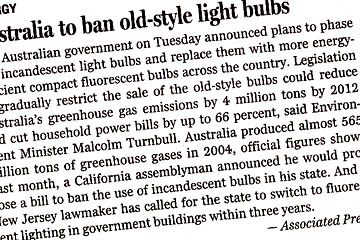 Surrealism + Marxism = Student loans?
Surrealism + Marxism = Student loans?
It's striking. It's memorable. It makes no sense.
This logo caught my eye in a 3/4 page ad in today's Plain Dealer. Great name, great image.
 It borrows from two iconic images that are part of our
cultural history, Rene Magritte's self-portrait The
Son of Man and
the equally well-known poster
of Cuban revolutionary Che Guevara,
later reproduced
by Andy Warhol.
It borrows from two iconic images that are part of our
cultural history, Rene Magritte's self-portrait The
Son of Man and
the equally well-known poster
of Cuban revolutionary Che Guevara,
later reproduced
by Andy Warhol.
 Combining these images strikes me as odd, although I discovered as I googled
them that the two are contemporaries. The Magritte is from 1964,
while the first of many variations of the Guevara poster was published by Jim
Fitzpatrick in 1968.
Combining these images strikes me as odd, although I discovered as I googled
them that the two are contemporaries. The Magritte is from 1964,
while the first of many variations of the Guevara poster was published by Jim
Fitzpatrick in 1968.
The company name is clever, too. Easy to remember, funny, and easy to spell—all important factors when choosing a URL.
Why does such a seeming mismatch of words and images work so well (at least in my view)?
This offbeat approach to the usually pretty staid lending industry is explained on the company's Who Are We? page on the Web: "MyRichUncle provides student loans, but our beliefs allow us to approach the student loan industry from a different angle." The company, by the way, is MRU Holdings, Inc.
A company publication explains their highly focused target market: "We are reaching out to the market in a more concentrated fashion in our first year: highly qualified, professionally inclined students attending top universities...Upon achieving success in this demographic, we will branch tier-wise into other schools to further our goal to expand access and choice in financing higher education."
And apparently it's working: "Our direct to consumer website, MyRichUncle.com, has created an extraordinary buzz over an extended period and tremendous word-of-mouth which enabled us to originate a cumulative origination volume of over $100 in million financing requests from 2002-2004."
TOP

No carrots, only sticks
As much as I want everyone to switch to compact fluorescent bulbs to save energy—as I said before —I'm not crazy about this approach.
Because Australia is per capita one of the major contributors to global warming it's encouraging to see them take action. But before getting the stick out, why not try the carrot?
After all, if the U.S. can give people huge tax breaks to buy Hummers instead of banning the damn things, can't we come up with a similar approach to saving energy?

